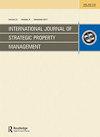Bank Credit Scheme Management and Success of Business Projects Financed by Banks in Rwanda; A Case Study of Bank of Kigali
IF 1.7
4区 管理学
Q3 MANAGEMENT
International Journal of Strategic Property Management
Pub Date : 2023-11-14
DOI:10.53819/81018102t5285
引用次数: 0
Abstract
The study sought to investigate the influence of bank credit scheme management in Kigali on the success of business projects filed by borrowers. It focused on examining the loan processes that lead to project success and identifying obstacles that impede it. The study was driven by three specific objectives: to determine the impact of credit appraisal on the success of business projects, to measure the influence of credit risk control, and to assess the effect of debt collection policy on project success. To accomplish these goals, the study adopted a descriptive case study design, employing both qualitative and quantitative methods to gain comprehensive insights. The study encompassed a population of 14,856, with a sample size of 95 respondents selected through a comprehensive sampling technique. Data collection was executed using questionnaires and unstructured interviews, with the Scientific Package for Social Science (SPSS) earmarked for data analysis using mean, standard deviation, and correlation coefficients. The study results indicated a significant consideration of respondent suggestions and inputs in financial statement lending and operating cash flow assumptions. The updated variables reflected a short to medium-term operating cash burn in the bank as per the financed projects. A strong correlation was found between credit appraisal and the success of business projects, evidenced by a Pearson correlation of 0.917** and a p-value of 0.000, significantly below the standard significance level of 0.01. This suggests that credit appraisal is a critical factor for the success of business projects financed by banks in Rwanda. The study recommended that the management should fortify financial statement lending and update operating cash flow assumptions regularly to mirror changing variables. Additionally, management should comprehend the probability of loss due to a borrower's failure by involving in participative budgeting and engaging in the credit preparation process to mitigate potential losses. The study also recommends prioritizing and improving credit appraisal processes to ensure thorough evaluation of loan applicants, strengthening debt collection policies to reduce default rates, and fostering a culture of continuous improvement and collaboration among banks in Rwanda. Additionally, it suggests a review of credit risk control practices to align them with the specific needs of businesses in the region Keywords: Bank Credit, Scheme Management, Success of Business Projects, Bank of Kigali, Rwanda卢旺达银行信贷计划管理与银行融资商业项目的成功基加利银行案例研究
这项研究试图调查基加利银行信贷计划管理对借款人提交的商业项目成功的影响。它侧重于检查导致项目成功的贷款流程,并确定阻碍项目成功的障碍。这项研究有三个具体目标:确定信用评估对商业项目成功的影响,衡量信用风险控制的影响,评估债务催收政策对项目成功的影响。为了实现这些目标,本研究采用了描述性案例研究设计,采用定性和定量方法来获得全面的见解。该研究涵盖了14,856人,通过综合抽样技术选择了95名受访者。数据收集采用问卷调查和非结构化访谈,使用社会科学科学软件包(SPSS)专门用于使用平均值,标准差和相关系数进行数据分析。研究结果表明,在财务报表贷款和经营性现金流量假设中,受访者的建议和投入得到了重要考虑。更新后的变量反映了银行按融资项目短期到中期的经营性现金消耗情况。信用评价与商业项目成功之间存在较强的相关性,Pearson相关系数为0.917**,p值为0.000,显著低于0.01的标准显著性水平。这表明信贷评估是卢旺达银行资助的商业项目取得成功的一个关键因素。该研究建议管理层应加强财务报表贷款,并定期更新经营现金流量假设,以反映不断变化的变量。此外,管理层应该通过参与预算和参与信贷准备过程来了解由于借款人失败而造成损失的可能性,以减轻潜在的损失。该研究还建议优先考虑和改进信贷评估程序,以确保对贷款申请人进行全面评估,加强债务催收政策,以降低违约率,并在卢旺达的银行之间培养持续改进和合作的文化。此外,报告建议对信贷风险控制做法进行审查,使其与该地区企业的具体需求保持一致。关键词:银行信贷,计划管理,商业项目成功,基加利银行,卢旺达
本文章由计算机程序翻译,如有差异,请以英文原文为准。
求助全文
约1分钟内获得全文
求助全文
来源期刊
CiteScore
4.00
自引率
18.50%
发文量
23
审稿时长
15 weeks
期刊介绍:
International Journal of Strategic Property Management is a peer-reviewed, interdisciplinary journal which publishes original research papers. The journal provides a forum for discussion and debate relating to all areas of strategic property management. Topics include, but are not limited to, the following: asset management, facilities management, property policy, budgeting and financial controls, enhancing residential property value, marketing and leasing, risk management, real estate valuation and investment, innovations in residential management, housing finance, sustainability and housing development, applications, etc.

 求助内容:
求助内容: 应助结果提醒方式:
应助结果提醒方式:


